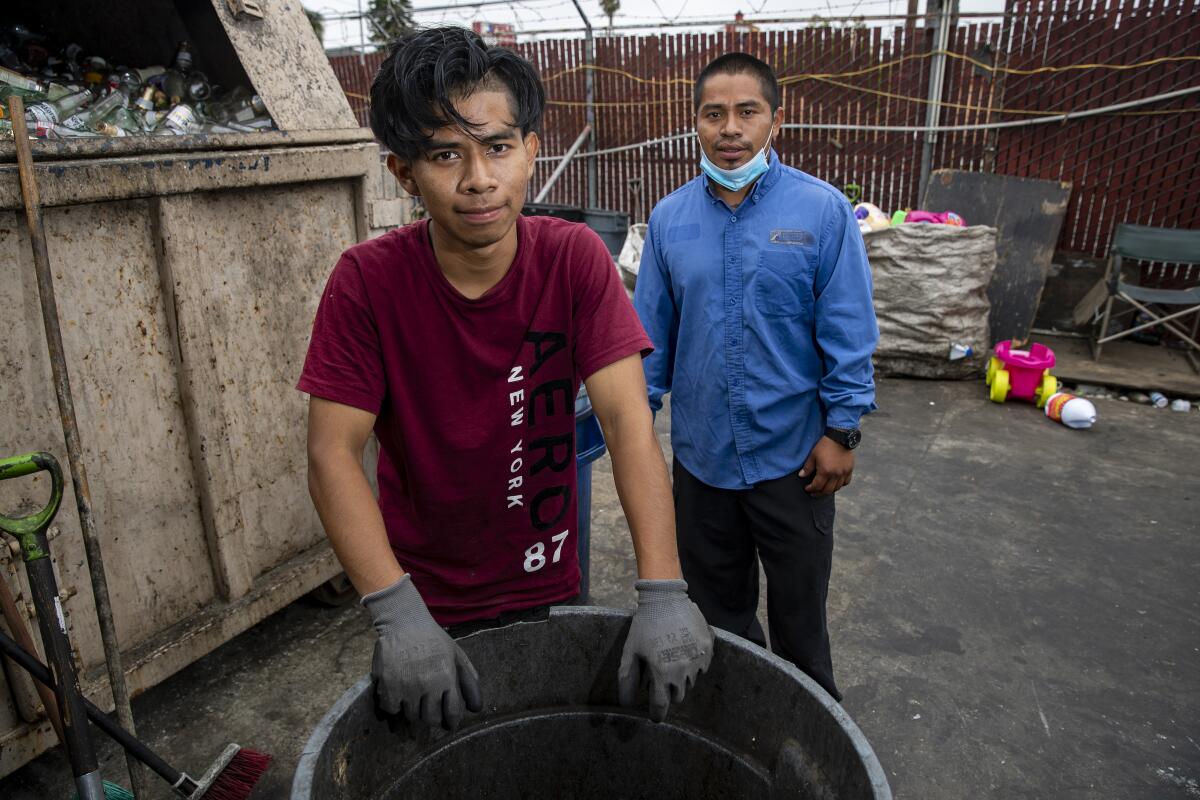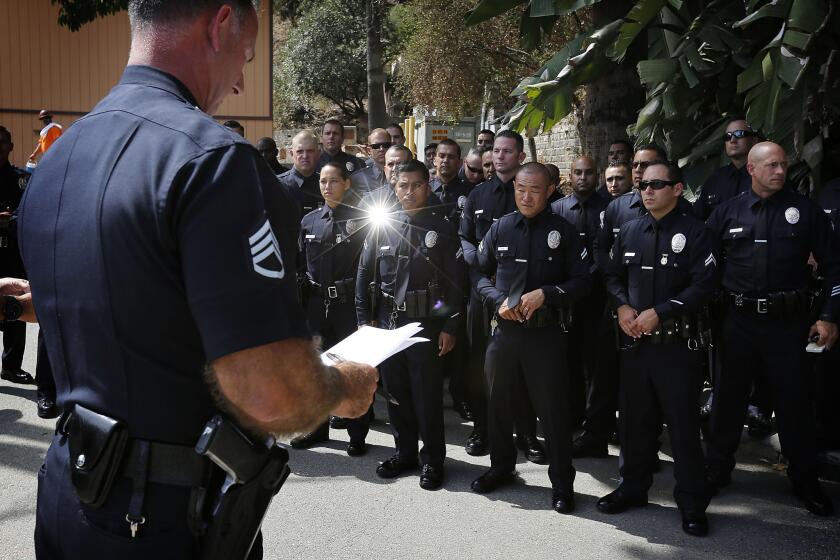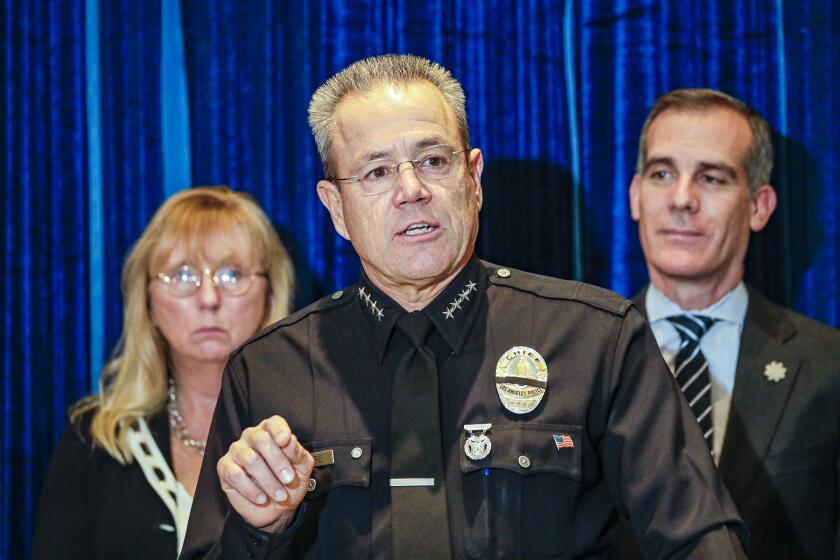The LAPD branded these two brothers MS-13 gang members. Prosecutors say they were deliberately framed

- Share via
Early on a Thursday morning in February, two men in suits rapped on the door of the South Los Angeles apartment that Gadseel Quiñonez shares with his little brother.
The men were from the Los Angeles Police Department’s Professional Standards Bureau — the cops who police the cops. They wanted to know whether Quiñonez, 29, or his brother belonged to any gangs. No, he told them. They asked whether they could take pictures of his tattoos. Sure, he said. He had nothing to hide.
Months later, three LAPD officers were charged with falsifying dozens of gang records, and the reason for the early morning visit became clear: Quiñonez and his brother, Jose, had been falsely identified as members of MS-13, a street gang notorious for macabre killings, according to a complaint filed by county prosecutors.
Gadseel and Jose Quiñonez are among dozens of people who county prosecutors say were falsely labeled as gang members or associates by Officers Braxton Shaw, Michael Coblentz and Nicolas Martinez. All three are with the LAPD’s elite Metropolitan Division.
An LAPD officer charged with falsifying records and obstructing justice was allowed to work in an elite division even though questions were raised about his credibility five years ago.
Although the Quiñonez brothers, like other alleged victims in the case, are identified in the complaint only by their first names and last initial, they confirmed being interviewed by internal investigators from the LAPD and described two heavy-handed stops near where they live and work in South Los Angeles.
An LAPD spokesman would not confirm or deny the identities of any alleged victims, citing the department’s continuing investigation. Nineteen more officers remain under investigation. A spokesman for the Los Angeles County district attorney’s office declined to comment.
In an interview, Shaw’s attorney, Greg Yacoubian, pushed back on what he said was an unfair characterization of the policemen as “rogue officers.” Shaw was doing nothing more than what was expected of him, Yacoubian said, which was to gather gang intelligence from dangerous parts of the city.
“He’s innocent,” Yacoubian said of Shaw. “Although these are complicated issues, I can say with a high level of confidence that when the dust settles, it will be clear he isn’t culpable of any criminal liability.”
In 2018, Gadseel Quiñonez was leaving a recycling center on West 92nd and Main streets, where he has worked since 2010, when a squad car pulled him over, he recalled. His brother, 16 at the time, was in the car. Jose had come to Los Angeles five months earlier from Guatemala, where their mother, father and four other siblings still live.
One of the officers — a white man, tall, burly and with a shaved head — opened the passenger-side door, grabbed Jose’s arm and wrenched him out of the car, Jose recalled. He and his brother were handcuffed and stood up against a fence while the officers searched Gadseel’s black BMW, the brothers said in separate interviews. The officers asked questions in English and Jose struggled to understand what was being said, he recalled.
LAPD Chief Michel Moore is seeking to fire an officer accused of falsely portraying individuals as gang members in official reports.
Gadseel recognized the white officer: A few months earlier, he said, the same man had pulled him over as he was leaving a liquor store on West 88th Street and Broadway. The officer had ordered him out of the car at gunpoint, searched his car and questioned him about cash he found inside, Gadseel recalled. When he tried to explain the cash was from the recycling business where he worked, the officer told him to “shut up,” he said.
This time, the officers asked Gadseel and Jose whether they were in a gang, the brothers said. No, they told them. The officers asked Gadseel whether his car was stolen, whether it really belonged to him, he recalled. He told them it did.
When Gadseel asked why they had been stopped, the officers said that he and his brother looked like gang members and that they’d heard rumors he was carrying a weapon, he recalled. Eventually, his boss at the recycling plant came out and spoke with the officers. They let the brothers go.
Afterward, Gadseel told Jose he “needed to behave, to follow the rules,” so he wouldn’t get in trouble with the police, Jose said. It was his first encounter with an American policeman, and it left him frightened and confused, he remembered.
The brothers could not recall the specific month in 2018 when they were stopped and questioned. But according to a complaint filed by county prosecutors, Shaw, partnered with Martinez, filled out two field interview cards on July 30, 2018, that falsely labeled a “Gadseel Q.” as an MS-13 gang member nicknamed “Squealer,” and a “Jose Q.” as an MS-13 gang member dubbed “Sneaks.”
Law enforcement agencies use these cards to track suspected gang members and associates. CalGang, a statewide clearinghouse of gang intelligence, drew on information from LAPD cards until July, when California Atty. Gen. Xavier Becerra, whose office oversees the database, revoked access to LAPD intelligence. LAPD Chief Michel Moore had ordered his officers in June to no longer enter names in the database.
CalGang is notoriously opaque, and none of its underlying intelligence is public record. Gadseel and Jose said they didn’t know or even suspect they’d been identified as gang members until a reporter contacted them.
“When they have proof that someone did something, they have the right to arrest you or throw you in jail or investigate you,” Gadseel said in Spanish. “But when there’s no proof, and they keep stopping you, or following you or watching you, waiting for you to fall, I don’t see a case there. They don’t have the right.”
Yacoubian, Shaw’s attorney, said some — but not all — people identified as gang members on LAPD field cards were entered in CalGang. Once Metropolitan Division officers filled out the cards in the field, the cards were sent to various LAPD geographic divisions where gang enforcement specialists vet the information and decide whom to add to the database, according to Yacoubian, who retired from the LAPD as a lieutenant before starting a law practice.
Yacoubian questioned whether any of the people allegedly misidentified as gang members suffered “adverse actions,” saying that unlike a police report, the field cards are an intelligence-gathering tool that, in and of itself, cannot be used to prosecute someone. And because the cards and database are not public, employers can’t view the records when weighing whether to give someone a job, he added.
Yacoubian described the cards as a useful tool to combat gangs that prey on the poorest, most distressed parts of the city. “Chilling that function is going to impact low-income, minority communities,” he said. “They’re the real losers in all of this.”
The cards that Shaw filled out for the Quiñonez brothers are among 43 he is charged with falsifying.
In April 2018, the officer wrote up a card for “Kivon W.,” whom he falsely described as a 77 Swans gang member known as “Dub Bird,” with a swan and 77 tattooed on his neck, the complaint said.
Kivon Williams told The Times he has tattoos of a dove and the date “10/17” on his neck, signifying the month and the day he met his girlfriend. Williams, like the Quiñonez brothers, said internal investigators from the LAPD came to his South Los Angeles home this year, interviewed him and took pictures of his tattoos.
Williams said he has heard nothing from the department since. He doesn’t know whether he is still in a gang database or what, if anything, he should do to have his name cleared.
Josh Rubenstein, a spokesman for the LAPD, said the department is removing names from the database as its internal investigation progresses, but he declined to address individual cases.
Gadseel Quiñonez doesn’t know whether he remains on a roster of alleged gang members and associates. It doesn’t worry him, he said. He knows who he is. He left Guatemala as a child for Memphis, Tenn., and once he got there, “I started working,” he said. “And I worked twice as hard to get ahead.”
“It never crossed my mind to join a gang,” he said. “No one wins that way.”
He came to Los Angeles 10 years ago and took a job at the recycling center where he still works today. He is a father to a 5-year-old boy and looks after his little brother, who works at the recycling plant too.
“El que nada debe, nada teme,” he said. He who has nothing to hide has nothing to fear.
Jose, now 18, is entering his final year at Dymally High School in South Los Angeles. He left Guatemala to find work here and send money home, he explained, speaking Spanish outside the recycling center where he sorts bottles and crushes glass, Monday through Wednesday, 8 a.m. to 4 p.m.
One day, he would like to work as a lawyer. Or maybe a police officer. “So I can help people,” he said.
More to Read
Sign up for Essential California
The most important California stories and recommendations in your inbox every morning.
You may occasionally receive promotional content from the Los Angeles Times.













